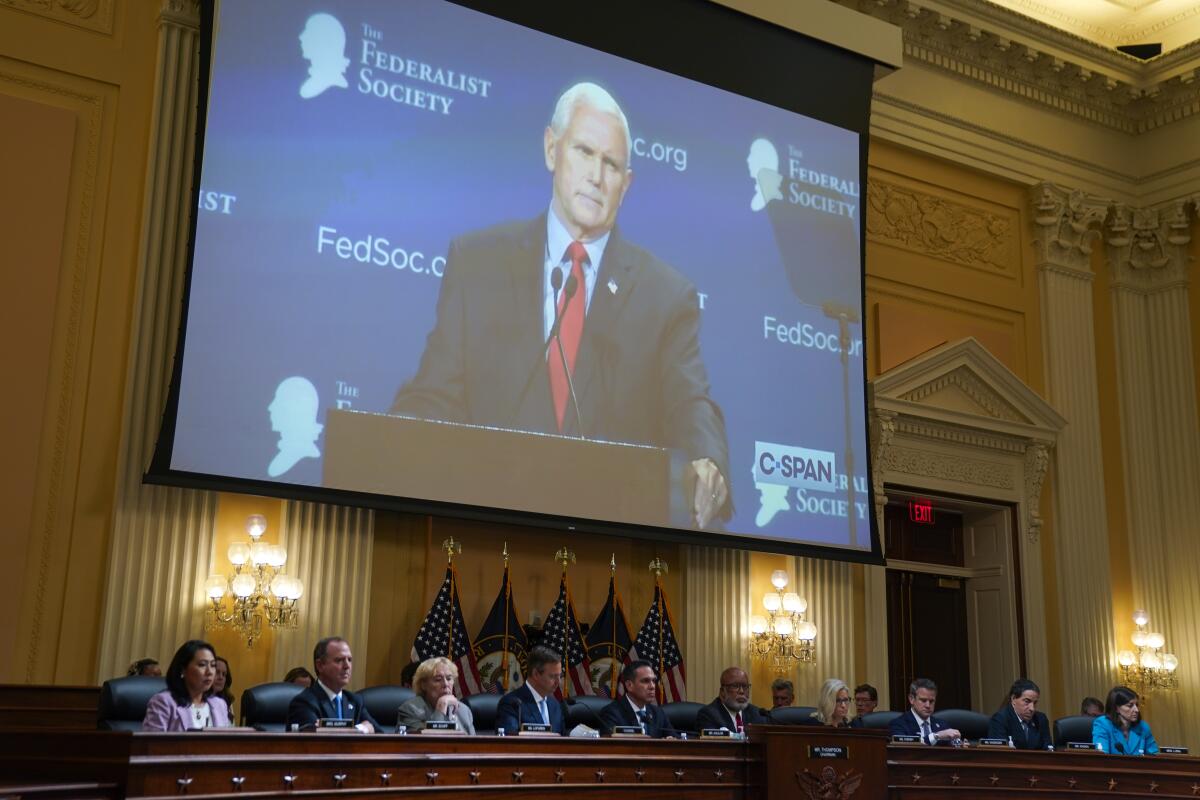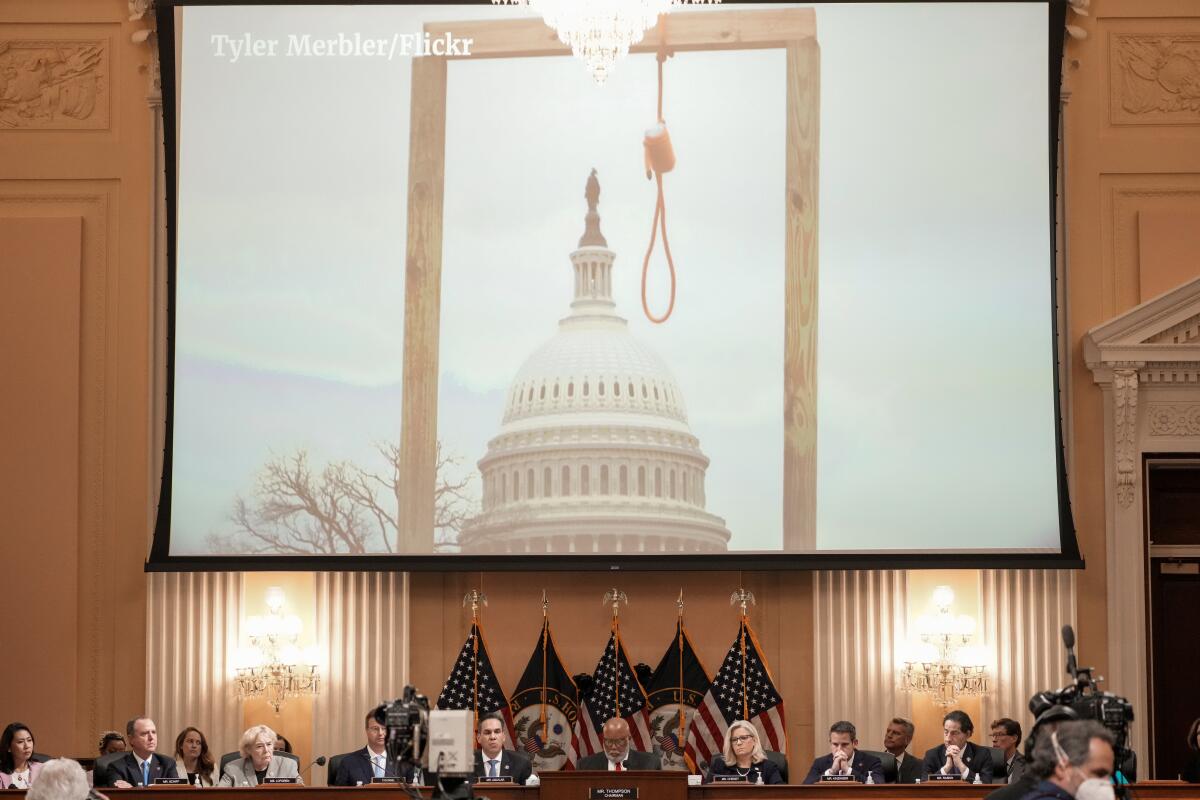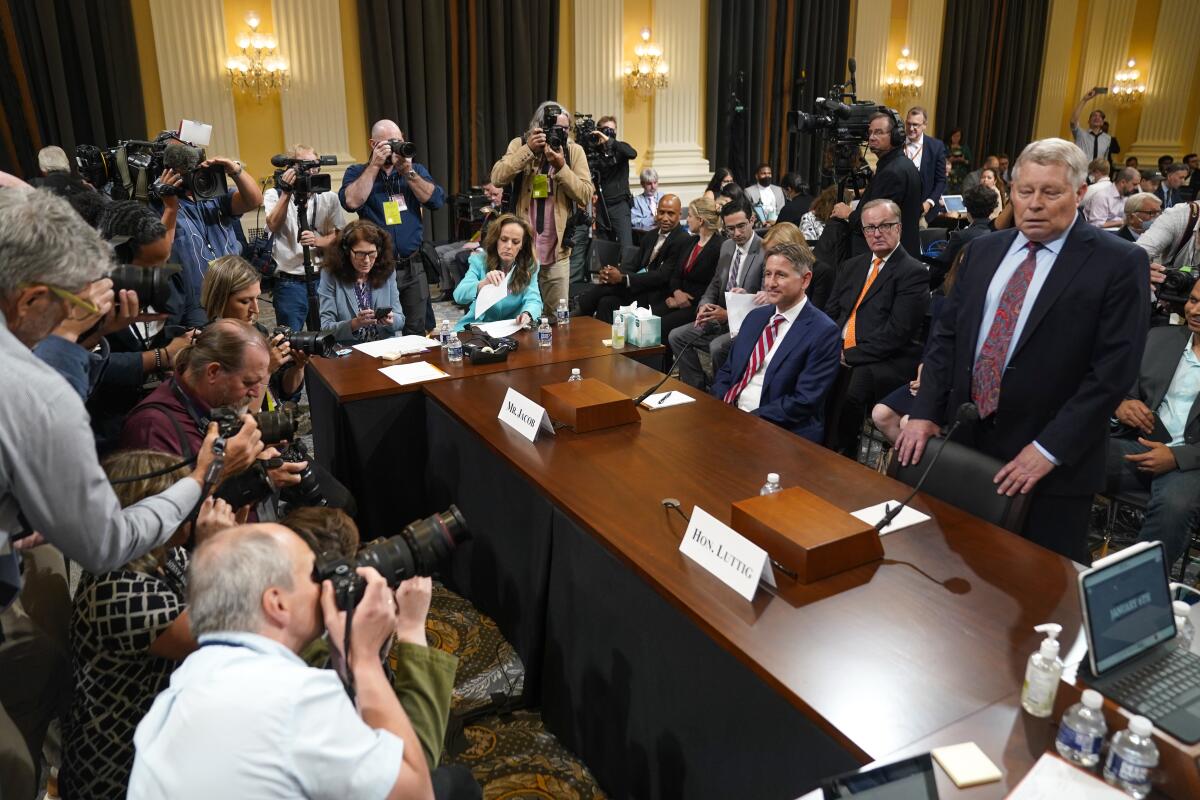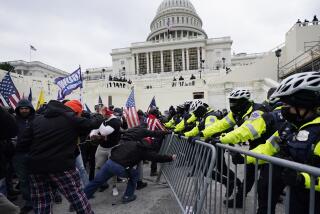Mike Pence ‘resisted the pressure,’ and other takeaways from the Jan. 6 hearing

- Share via
WASHINGTON — The third hearing of the House Jan. 6 committee on Thursday focused on the role of former Vice President Mike Pence, who became a crucial player in stopping former President Trump’s plan to overturn the 2020 election.
Pence had been among the most loyal soldiers of Trump’s presidency, defending him against multiple ethics charges and praising him so effusively that many ridiculed him as a sycophant.
But on Jan. 6, 2021, he said no to Trump’s demand that he exceed the authority of his ceremonial duty as vice president in counting the electoral college vote, which would have constituted an illegal attempt to help Trump cling to power.
How will Pence be judged?
Members of the committee and witnesses said in the strongest terms Thursday that, at least when it came to Jan. 6, Pence was a hero.
Trump tried everything, including 62 failed lawsuits and a pressure campaign against officials in key states that Joe Biden had won, before latching on to a last-ditch attempt to persuade Pence to recognize a fake slate of electors from those states. Trump believed that would give him enough electoral votes to stay in power.
Rep. Liz Cheney (R-Wyo.) praised “the earnest efforts of Mike Pence, who was determined to abide by his oath of office.”
Retired federal Judge J. Michael Luttig, a hero to conservatives and former mentor to Trump lawyer John Eastman, said the “declaration of Donald Trump as the next president would have plunged America into what I believe would have been tantamount to a revolution within a constitutional crisis.” Eastman had joined Trump in the pressure campaign against Pence.
Rep. Bennie Thompson (D-Miss.), chairman of the committee, said Pence “resisted the pressure. He knew it was illegal. He knew it was wrong.
“We are fortunate for Mr. Pence — his courage — on Jan. 6. Our democracy came dangerously close to catastrophe. That courage put him in tremendous danger.”

What danger did Pence face?
The committee played video of pro-Trump rioters at the Capitol threatening in vulgar terms to drag Pence through the streets, calling him “a traitor,” chanting, “Hang Mike Pence,” and holding a gallows to underscore their point, after Trump falsely told supporters at a rally earlier that day that Pence had the authority to overturn the election, and just needed the courage to do it.
Rep. Pete Aguilar (D-Redlands), who helped lead Thursday’s hearing, said the committee learned that Pence was not mentioned in early drafts of Trump’s Jan. 6 speech. Trump, he said, ad-libbed criticism of the vice president and then posted threatening tweets, provoking the mob.
Trump was overheard by his daughter Ivanka calling Pence what she described as “the P-word” in a phone call, and the president never called Pence back to check on his safety, according to testimony.
As the crowd grew increasingly violent, Pence spent 4½ hours in the Capitol, at times just 40 feet from the mob, refusing the Secret Service’s directions to leave in a motorcade.
“The vice president did not want to take any chance that the world would see the vice president of the United States fleeing the United States Capitol,” testified Greg Jacob, Pence’s top White House attorney.
Pence holds to the Constitution
Pence has long positioned himself as a constitutional conservative, a supporter of the tea party movement’s embrace of limited government.
But many tea party supporters have since gone on to back Trump’s exceedingly broad views of presidential power and, significantly, his unfounded view that the Constitution somehow gave him the right to stay in power. On Thursday, the committee played these remarks from Pence:
“I had no right to overturn the election. The presidency belongs to the American people and the American people alone. And frankly, there is no idea more un-America than the notion that any one person could choose the American president.”
Pence followed Gore in making ‘pretty easy choice’
Several people who had counseled Pence before Jan. 6 invoked former Vice President Al Gore, pointing out that he could have made himself president in 2001 if Trump’s theory were true. Gore never appeared to entertain the notion despite the 2000 election being much closer than 2020’s.
Several witnesses testified that many of Trump’s advisors, including Eastman, knew their theory that Pence could declare Trump the winner was bogus.
The committee played a statement from Gore on the 2000 election in which he invoked “the importance of the United States of America in all of human history” and what Lincoln called “the last best hope of humankind.”
“The choice between one’s own disappointment in your personal career and upholding the noble traditions of America’s democracy — it’s a pretty easy choice when it comes down to it,” Gore said.

Democracy remains under threat
The nation may have withstood Jan. 6, but Luttig argued that “Donald Trump and his allies and supporters are a clear and present danger to American democracy.”
He said the former president, by working to elect candidates who share his view that those who rejected the 2020 election results were justified, is “executing [a similar] blueprint for 2024 in open and plain view of the American public.”
Will Pence’s act to preserve democracy help him politically?
It’s not likely.
Pence has been positioning himself as a potential 2024 presidential candidate. Early on, he took pains to avoid criticizing Trump, hoping to retain his standing in the MAGA world for the loyalty he showed Trump for over four years before Jan. 6.
But Trump continued criticizing him. And any hope Pence might have had of leading a post-Trump GOP has probably dissipated.
Other Republicans have been afraid to distance themselves from Trump’s false election claims. Many are winning elections based on them. And Trump has continued to make his critics pay a steep political price.
Cheney, the committee’s vice chair, is trying to hold off a Trump-backed candidate, Harriet Hageman, in Wyoming’s GOP primary.
And while Democrats may hold Pence up as a vital historical figure, that is unlikely to win him any votes.
More to Read
Get the L.A. Times Politics newsletter
Deeply reported insights into legislation, politics and policy from Sacramento, Washington and beyond. In your inbox twice per week.
You may occasionally receive promotional content from the Los Angeles Times.











